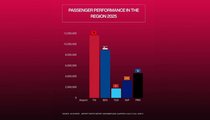American companies worried if China retaliates to fight Trump!

With President-elect Donald Trump's trade and foreign policy team taking a tough stance on China, US companies are increasingly concerned that a tough approach could hamper their prospects in the world's second-largest economy. world and turn them into targets of Chinese retaliation.
Trump has threatened to hit China with at least 60% tariffs and has vowed to end reliance on the country. That alone would be disruptive. That would force companies to scramble to find other sources of supply, American consumers to pay higher prices at the store and, many experts say, lead to job losses.
In addition, the Chinese government could respond with an expanded set of tools to target American businesses. Those actions could range from economic changes to diplomacy and security issues, Kennedy said, adding that China could "push back as much as it can."
The more combative relationship between the US and China also carries the risk of a public backlash amid rising Chinese nationalism. The Chinese government has tight controls on the flow of information that has led to consumer boycotts of international brands.
During Trump's first term, the Chinese government retaliated against US tariffs by placing its own tariffs on US imports. The US-China Business Council, in collaboration with Oxford Economics, estimates that a new tariff battle could result in a "permanent loss of revenue and pressure on businesses to cut jobs and investment plans" by up to 801,000 net job losses. until 2025.
The report predicted that Nevada, Florida and Arizona would be among the states hardest hit by such tariffs because of their economic dependence on consumer demand. Manufacturing states such as Indiana, Kansas, Michigan and Ohio will also be vulnerable, the Oxford report said. The swing states of Nevada, Arizona and Michigan all returned to Trump in the 2024 election, helping to return him to the White House.
During the latest trade battle, China also stopped buying agricultural products from the US. The move targeted key US exports such as soybeans, disproportionately hurting rural parts of the US where Trump has strong support. Two years ago, China started importing corn from Brazil. The country is now China's largest corn supplier, surpassing the U.S. Beijing, and may also expand its punitive methods to include targeting U.S. companies operating on Chinese soil.
The business climate in China has tightened significantly since Trump's first term. Despite the Chinese leadership's stated efforts to welcome international companies, the AmCham China Business Climate Survey Report 2024 found that 39% of companies surveyed felt less welcome in China.
There is also the risk of legal and regulatory changes in China that could threaten US companies. In recent years, China made significant revisions to its export control regulations. These tighter controls have restricted metals critical to the US clean energy and semiconductor sectors.
Analysts predict China will do the same during Trump's second term, aiming to deprive US industry of key minerals and ingredients. Beijing has also improved laws such as an anti-foreign sanctions law that triggers investigations, fines and restrictions on operations in the country.
Even before the US election, Beijing had shown signs of targeting some US companies. For example, PVH, the owner of Calvin Klein, is under investigation thanks to this law. China has an improved anti-espionage law, which international business groups such as AmCham China have criticized for what they say is "ambiguity" in policy.
The law has led to detentions and raids on executives and staff of international firms, and has made it easier for officials to impose exit bans, preventing accused persons from leaving the country. Many worry that the day-to-day regulatory grind to operate in China could become a bigger hurdle under an increasingly retaliatory environment. Since Trump's first term, Chinese leader Xi Jinping has consolidated power even further.
If Xi signals that US companies are out of favor, they can expect regulations on permits, security checks, licensing and other approvals to be interpreted more strictly by lower-level officials, experts say.

35 years since the fall of the Berlin Wall - The values of 1989 and today's challenges of democracy
The Economist Germany celebrated on Saturday the 35th anniversary of the fall of the Berlin Wall, which for decades divided West and East Germany. The fall......

Turkey fines Amazon with 2 million lira for data breach!
Turkey's Personal Data Protection Board (KVKK) has fined Amazon.com, launching new gaming platform Twitch, 2 million liras ($58,000) for a data breach, the......

How much income goes to rent for minimum wage citizens in Europe?
"Housing, water, electricity and gas" accounted for the largest share of household expenditure in the EU. In 2022, almost a quarter of all household......

The Dutch government avoids collapse after the resignation of the secretary of state!
The Dutch government dominated by far-right leader Geert Wilders has survived - for now - a government crisis that centered on the resignation of the finance......

Gas prices rise after Gazprom stops deliveries to Austria!
Gazprom Export has announced that it will stop gas supplies to Austria after more than 50 years, from November 16. This follows Austria's largest fossil fuel......

China's Fertility Decline - Challenges and New Policies Aiming to Boost Fertility
China's efforts to raise birth rates must still address the underlying causes of their rapid decline, analysts point out. Although the country began easing......

Britain, £2bn for undersea cable - New link offers clean energy, reduces gas dependency
British energy regulator Ofgem has approved a £2 billion funding package to build around 200 kilometers of new submarine and underground cables linking......

Is the investigation continuing in the aesthetic centers? - Ndoi: We are at the stage where statements are received from the subjects
A short time ago, the police undertook an action where they hit the aesthetic centers that developed their activity with contraband goods. In an interview......


















